Applied Ethics & Sustainability: AI Replacing Human Labor Analysis
VerifiedAdded on 2023/06/14
|6
|1579
|137
Essay
AI Summary
This essay delves into the ethical considerations surrounding the introduction of artificial intelligence (AI) in companies to replace human labor. It begins by providing a background on AI, highlighting its potential benefits and threats, particularly concerning job displacement and potential errors. The c...
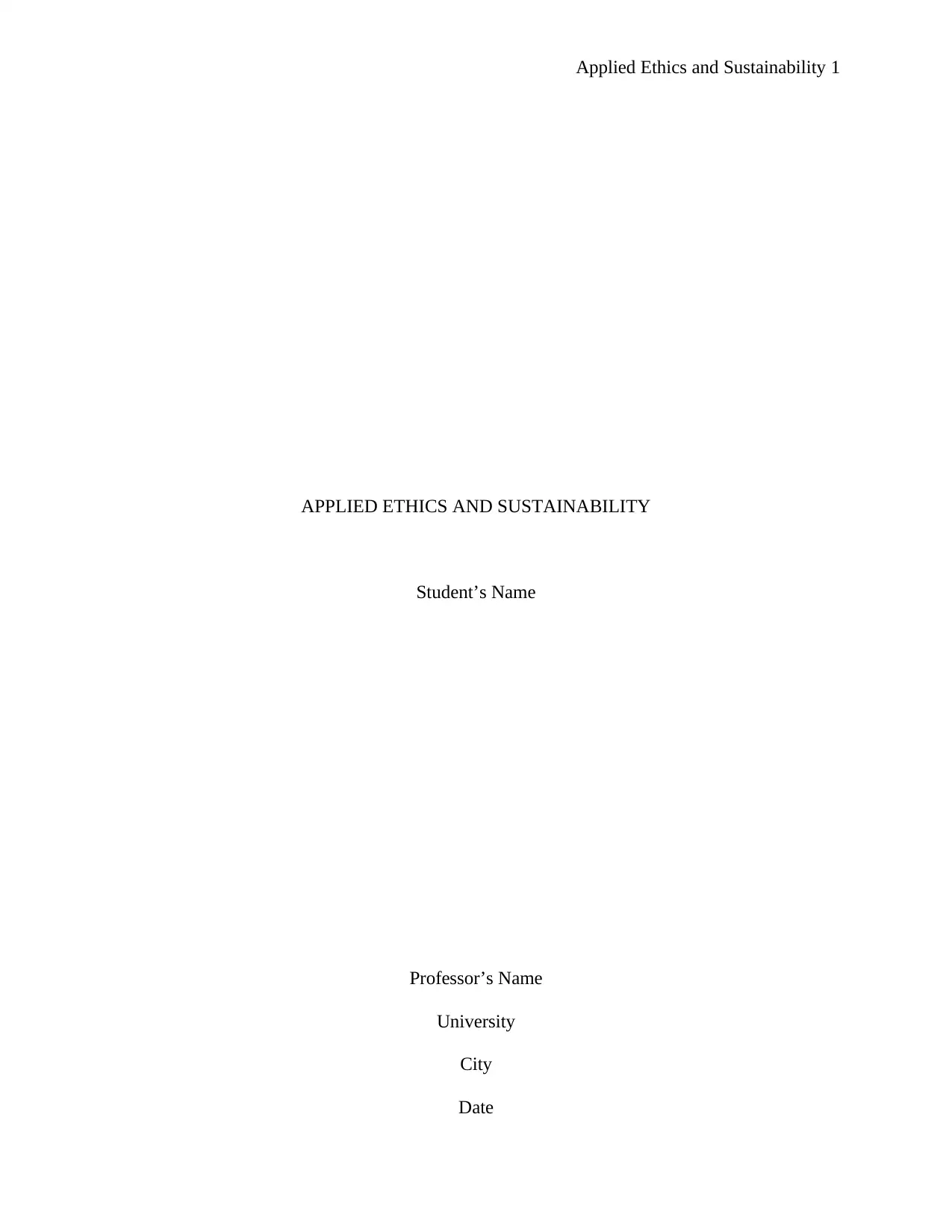
Applied Ethics and Sustainability 1
APPLIED ETHICS AND SUSTAINABILITY
Student’s Name
Professor’s Name
University
City
Date
APPLIED ETHICS AND SUSTAINABILITY
Student’s Name
Professor’s Name
University
City
Date
Paraphrase This Document
Need a fresh take? Get an instant paraphrase of this document with our AI Paraphraser
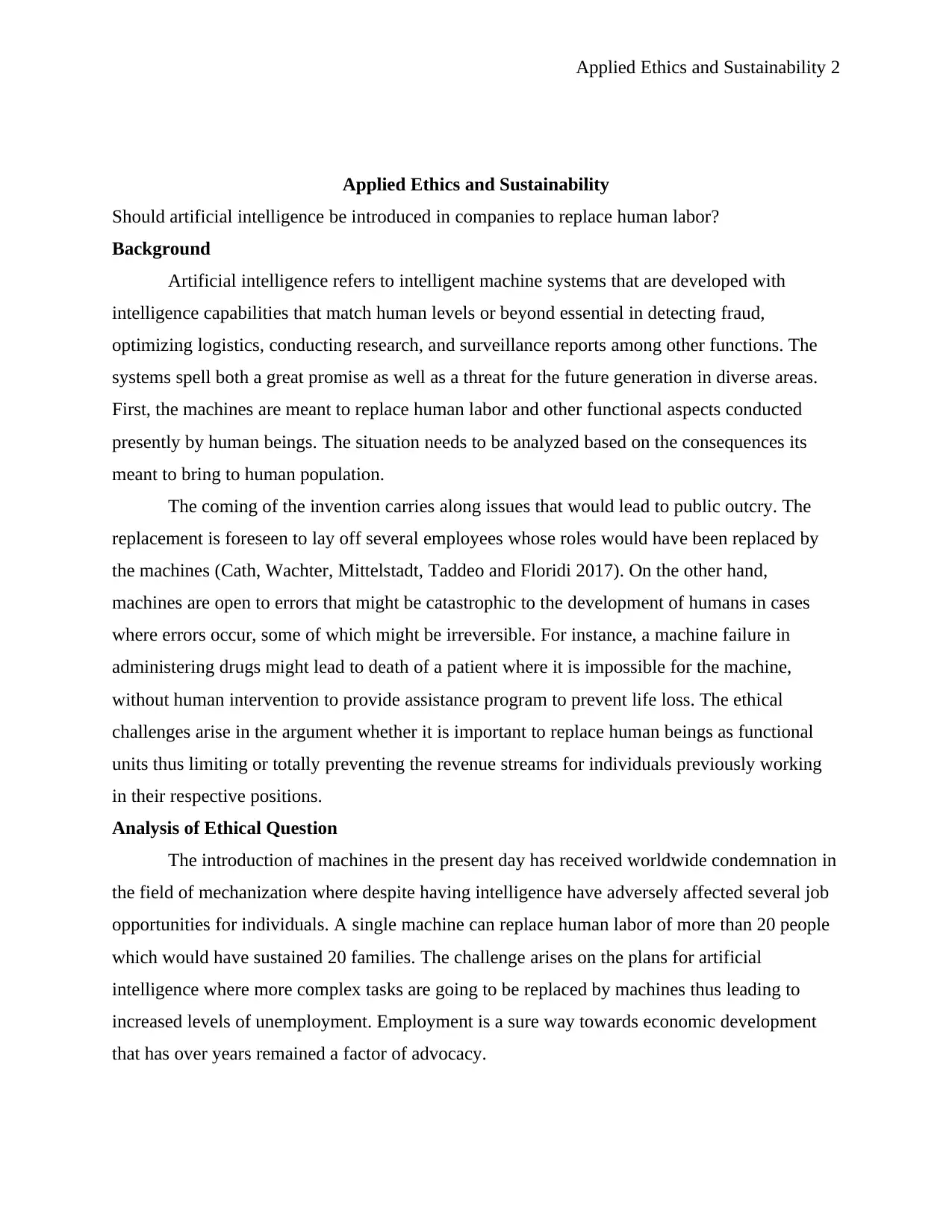
Applied Ethics and Sustainability 2
Applied Ethics and Sustainability
Should artificial intelligence be introduced in companies to replace human labor?
Background
Artificial intelligence refers to intelligent machine systems that are developed with
intelligence capabilities that match human levels or beyond essential in detecting fraud,
optimizing logistics, conducting research, and surveillance reports among other functions. The
systems spell both a great promise as well as a threat for the future generation in diverse areas.
First, the machines are meant to replace human labor and other functional aspects conducted
presently by human beings. The situation needs to be analyzed based on the consequences its
meant to bring to human population.
The coming of the invention carries along issues that would lead to public outcry. The
replacement is foreseen to lay off several employees whose roles would have been replaced by
the machines (Cath, Wachter, Mittelstadt, Taddeo and Floridi 2017). On the other hand,
machines are open to errors that might be catastrophic to the development of humans in cases
where errors occur, some of which might be irreversible. For instance, a machine failure in
administering drugs might lead to death of a patient where it is impossible for the machine,
without human intervention to provide assistance program to prevent life loss. The ethical
challenges arise in the argument whether it is important to replace human beings as functional
units thus limiting or totally preventing the revenue streams for individuals previously working
in their respective positions.
Analysis of Ethical Question
The introduction of machines in the present day has received worldwide condemnation in
the field of mechanization where despite having intelligence have adversely affected several job
opportunities for individuals. A single machine can replace human labor of more than 20 people
which would have sustained 20 families. The challenge arises on the plans for artificial
intelligence where more complex tasks are going to be replaced by machines thus leading to
increased levels of unemployment. Employment is a sure way towards economic development
that has over years remained a factor of advocacy.
Applied Ethics and Sustainability
Should artificial intelligence be introduced in companies to replace human labor?
Background
Artificial intelligence refers to intelligent machine systems that are developed with
intelligence capabilities that match human levels or beyond essential in detecting fraud,
optimizing logistics, conducting research, and surveillance reports among other functions. The
systems spell both a great promise as well as a threat for the future generation in diverse areas.
First, the machines are meant to replace human labor and other functional aspects conducted
presently by human beings. The situation needs to be analyzed based on the consequences its
meant to bring to human population.
The coming of the invention carries along issues that would lead to public outcry. The
replacement is foreseen to lay off several employees whose roles would have been replaced by
the machines (Cath, Wachter, Mittelstadt, Taddeo and Floridi 2017). On the other hand,
machines are open to errors that might be catastrophic to the development of humans in cases
where errors occur, some of which might be irreversible. For instance, a machine failure in
administering drugs might lead to death of a patient where it is impossible for the machine,
without human intervention to provide assistance program to prevent life loss. The ethical
challenges arise in the argument whether it is important to replace human beings as functional
units thus limiting or totally preventing the revenue streams for individuals previously working
in their respective positions.
Analysis of Ethical Question
The introduction of machines in the present day has received worldwide condemnation in
the field of mechanization where despite having intelligence have adversely affected several job
opportunities for individuals. A single machine can replace human labor of more than 20 people
which would have sustained 20 families. The challenge arises on the plans for artificial
intelligence where more complex tasks are going to be replaced by machines thus leading to
increased levels of unemployment. Employment is a sure way towards economic development
that has over years remained a factor of advocacy.
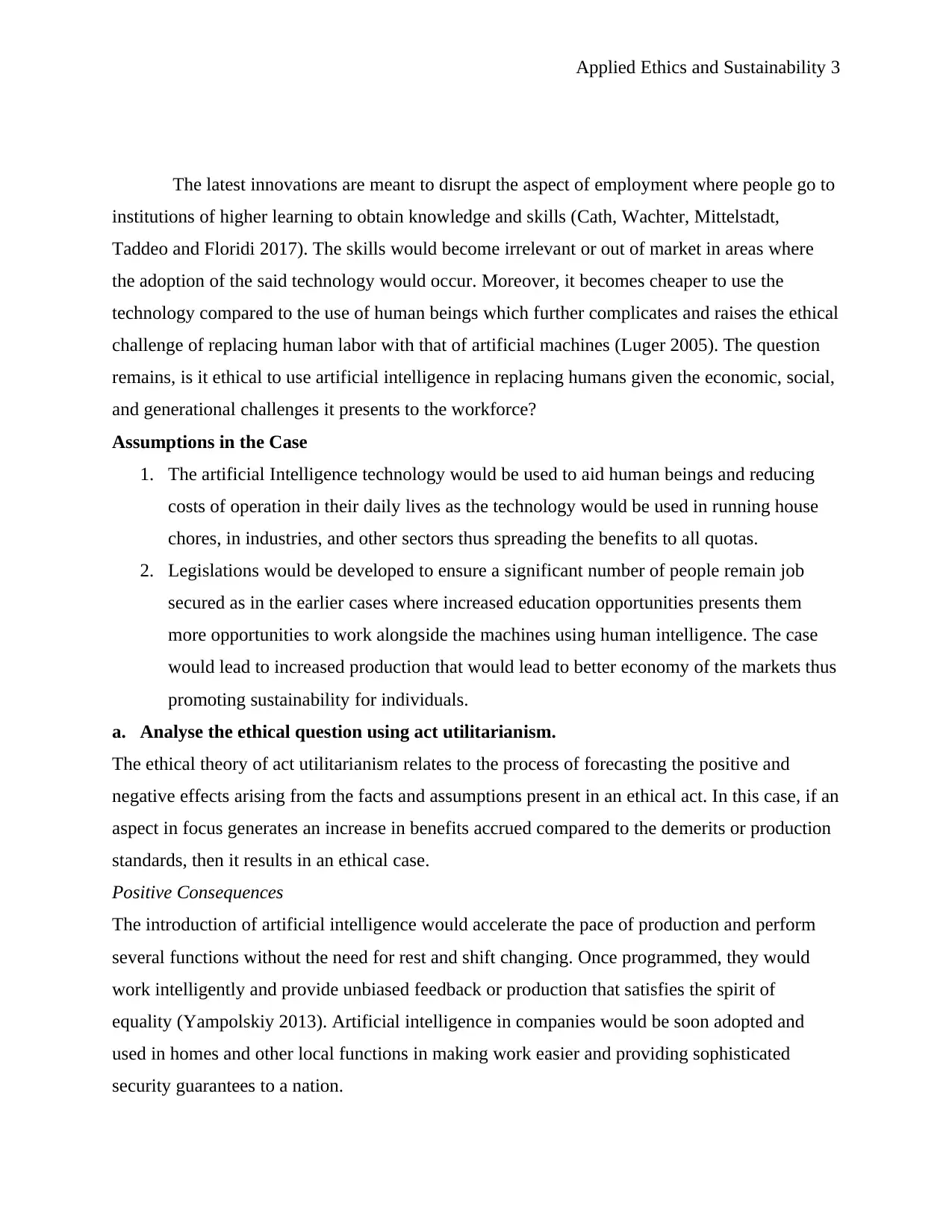
Applied Ethics and Sustainability 3
The latest innovations are meant to disrupt the aspect of employment where people go to
institutions of higher learning to obtain knowledge and skills (Cath, Wachter, Mittelstadt,
Taddeo and Floridi 2017). The skills would become irrelevant or out of market in areas where
the adoption of the said technology would occur. Moreover, it becomes cheaper to use the
technology compared to the use of human beings which further complicates and raises the ethical
challenge of replacing human labor with that of artificial machines (Luger 2005). The question
remains, is it ethical to use artificial intelligence in replacing humans given the economic, social,
and generational challenges it presents to the workforce?
Assumptions in the Case
1. The artificial Intelligence technology would be used to aid human beings and reducing
costs of operation in their daily lives as the technology would be used in running house
chores, in industries, and other sectors thus spreading the benefits to all quotas.
2. Legislations would be developed to ensure a significant number of people remain job
secured as in the earlier cases where increased education opportunities presents them
more opportunities to work alongside the machines using human intelligence. The case
would lead to increased production that would lead to better economy of the markets thus
promoting sustainability for individuals.
a. Analyse the ethical question using act utilitarianism.
The ethical theory of act utilitarianism relates to the process of forecasting the positive and
negative effects arising from the facts and assumptions present in an ethical act. In this case, if an
aspect in focus generates an increase in benefits accrued compared to the demerits or production
standards, then it results in an ethical case.
Positive Consequences
The introduction of artificial intelligence would accelerate the pace of production and perform
several functions without the need for rest and shift changing. Once programmed, they would
work intelligently and provide unbiased feedback or production that satisfies the spirit of
equality (Yampolskiy 2013). Artificial intelligence in companies would be soon adopted and
used in homes and other local functions in making work easier and providing sophisticated
security guarantees to a nation.
The latest innovations are meant to disrupt the aspect of employment where people go to
institutions of higher learning to obtain knowledge and skills (Cath, Wachter, Mittelstadt,
Taddeo and Floridi 2017). The skills would become irrelevant or out of market in areas where
the adoption of the said technology would occur. Moreover, it becomes cheaper to use the
technology compared to the use of human beings which further complicates and raises the ethical
challenge of replacing human labor with that of artificial machines (Luger 2005). The question
remains, is it ethical to use artificial intelligence in replacing humans given the economic, social,
and generational challenges it presents to the workforce?
Assumptions in the Case
1. The artificial Intelligence technology would be used to aid human beings and reducing
costs of operation in their daily lives as the technology would be used in running house
chores, in industries, and other sectors thus spreading the benefits to all quotas.
2. Legislations would be developed to ensure a significant number of people remain job
secured as in the earlier cases where increased education opportunities presents them
more opportunities to work alongside the machines using human intelligence. The case
would lead to increased production that would lead to better economy of the markets thus
promoting sustainability for individuals.
a. Analyse the ethical question using act utilitarianism.
The ethical theory of act utilitarianism relates to the process of forecasting the positive and
negative effects arising from the facts and assumptions present in an ethical act. In this case, if an
aspect in focus generates an increase in benefits accrued compared to the demerits or production
standards, then it results in an ethical case.
Positive Consequences
The introduction of artificial intelligence would accelerate the pace of production and perform
several functions without the need for rest and shift changing. Once programmed, they would
work intelligently and provide unbiased feedback or production that satisfies the spirit of
equality (Yampolskiy 2013). Artificial intelligence in companies would be soon adopted and
used in homes and other local functions in making work easier and providing sophisticated
security guarantees to a nation.
⊘ This is a preview!⊘
Do you want full access?
Subscribe today to unlock all pages.

Trusted by 1+ million students worldwide
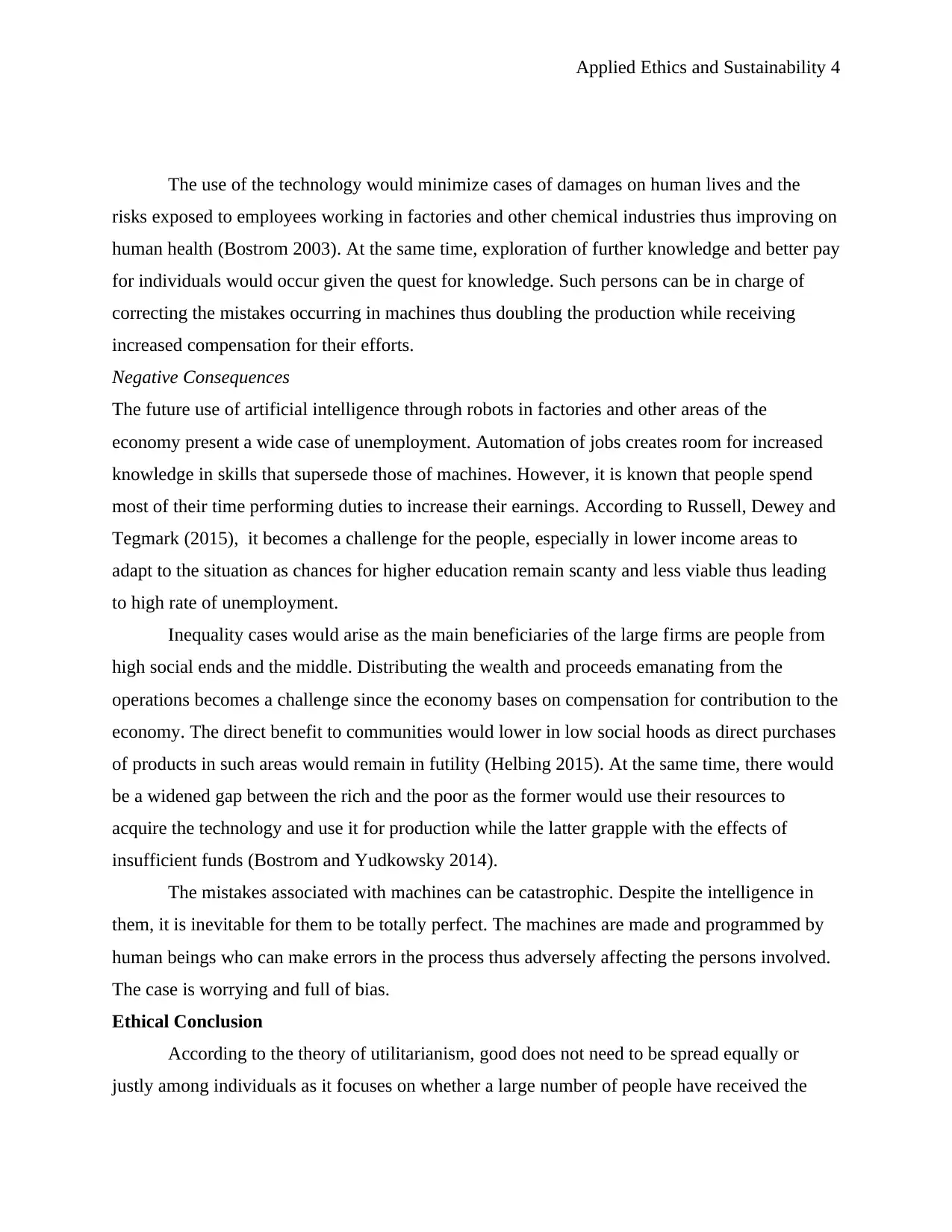
Applied Ethics and Sustainability 4
The use of the technology would minimize cases of damages on human lives and the
risks exposed to employees working in factories and other chemical industries thus improving on
human health (Bostrom 2003). At the same time, exploration of further knowledge and better pay
for individuals would occur given the quest for knowledge. Such persons can be in charge of
correcting the mistakes occurring in machines thus doubling the production while receiving
increased compensation for their efforts.
Negative Consequences
The future use of artificial intelligence through robots in factories and other areas of the
economy present a wide case of unemployment. Automation of jobs creates room for increased
knowledge in skills that supersede those of machines. However, it is known that people spend
most of their time performing duties to increase their earnings. According to Russell, Dewey and
Tegmark (2015), it becomes a challenge for the people, especially in lower income areas to
adapt to the situation as chances for higher education remain scanty and less viable thus leading
to high rate of unemployment.
Inequality cases would arise as the main beneficiaries of the large firms are people from
high social ends and the middle. Distributing the wealth and proceeds emanating from the
operations becomes a challenge since the economy bases on compensation for contribution to the
economy. The direct benefit to communities would lower in low social hoods as direct purchases
of products in such areas would remain in futility (Helbing 2015). At the same time, there would
be a widened gap between the rich and the poor as the former would use their resources to
acquire the technology and use it for production while the latter grapple with the effects of
insufficient funds (Bostrom and Yudkowsky 2014).
The mistakes associated with machines can be catastrophic. Despite the intelligence in
them, it is inevitable for them to be totally perfect. The machines are made and programmed by
human beings who can make errors in the process thus adversely affecting the persons involved.
The case is worrying and full of bias.
Ethical Conclusion
According to the theory of utilitarianism, good does not need to be spread equally or
justly among individuals as it focuses on whether a large number of people have received the
The use of the technology would minimize cases of damages on human lives and the
risks exposed to employees working in factories and other chemical industries thus improving on
human health (Bostrom 2003). At the same time, exploration of further knowledge and better pay
for individuals would occur given the quest for knowledge. Such persons can be in charge of
correcting the mistakes occurring in machines thus doubling the production while receiving
increased compensation for their efforts.
Negative Consequences
The future use of artificial intelligence through robots in factories and other areas of the
economy present a wide case of unemployment. Automation of jobs creates room for increased
knowledge in skills that supersede those of machines. However, it is known that people spend
most of their time performing duties to increase their earnings. According to Russell, Dewey and
Tegmark (2015), it becomes a challenge for the people, especially in lower income areas to
adapt to the situation as chances for higher education remain scanty and less viable thus leading
to high rate of unemployment.
Inequality cases would arise as the main beneficiaries of the large firms are people from
high social ends and the middle. Distributing the wealth and proceeds emanating from the
operations becomes a challenge since the economy bases on compensation for contribution to the
economy. The direct benefit to communities would lower in low social hoods as direct purchases
of products in such areas would remain in futility (Helbing 2015). At the same time, there would
be a widened gap between the rich and the poor as the former would use their resources to
acquire the technology and use it for production while the latter grapple with the effects of
insufficient funds (Bostrom and Yudkowsky 2014).
The mistakes associated with machines can be catastrophic. Despite the intelligence in
them, it is inevitable for them to be totally perfect. The machines are made and programmed by
human beings who can make errors in the process thus adversely affecting the persons involved.
The case is worrying and full of bias.
Ethical Conclusion
According to the theory of utilitarianism, good does not need to be spread equally or
justly among individuals as it focuses on whether a large number of people have received the
Paraphrase This Document
Need a fresh take? Get an instant paraphrase of this document with our AI Paraphraser
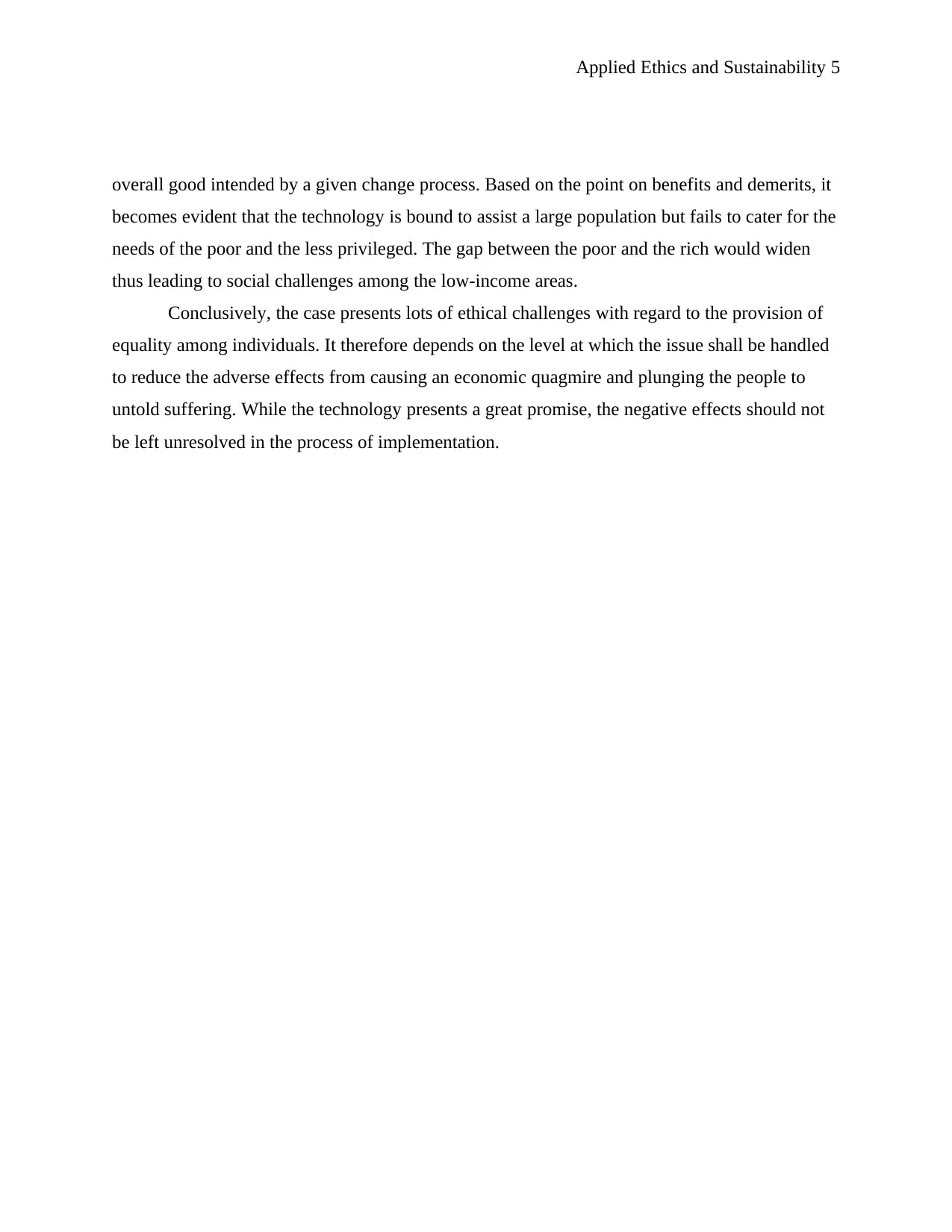
Applied Ethics and Sustainability 5
overall good intended by a given change process. Based on the point on benefits and demerits, it
becomes evident that the technology is bound to assist a large population but fails to cater for the
needs of the poor and the less privileged. The gap between the poor and the rich would widen
thus leading to social challenges among the low-income areas.
Conclusively, the case presents lots of ethical challenges with regard to the provision of
equality among individuals. It therefore depends on the level at which the issue shall be handled
to reduce the adverse effects from causing an economic quagmire and plunging the people to
untold suffering. While the technology presents a great promise, the negative effects should not
be left unresolved in the process of implementation.
overall good intended by a given change process. Based on the point on benefits and demerits, it
becomes evident that the technology is bound to assist a large population but fails to cater for the
needs of the poor and the less privileged. The gap between the poor and the rich would widen
thus leading to social challenges among the low-income areas.
Conclusively, the case presents lots of ethical challenges with regard to the provision of
equality among individuals. It therefore depends on the level at which the issue shall be handled
to reduce the adverse effects from causing an economic quagmire and plunging the people to
untold suffering. While the technology presents a great promise, the negative effects should not
be left unresolved in the process of implementation.
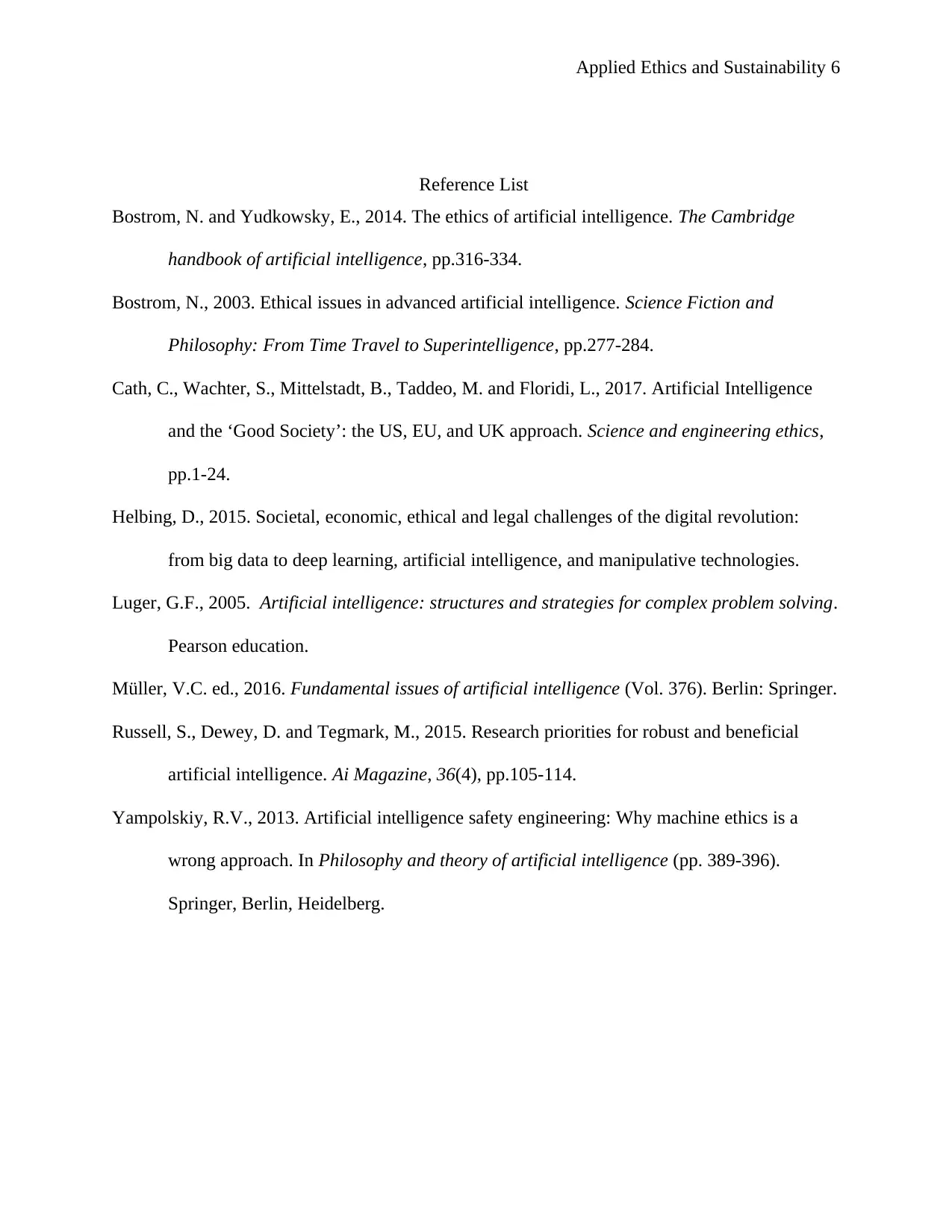
Applied Ethics and Sustainability 6
Reference List
Bostrom, N. and Yudkowsky, E., 2014. The ethics of artificial intelligence. The Cambridge
handbook of artificial intelligence, pp.316-334.
Bostrom, N., 2003. Ethical issues in advanced artificial intelligence. Science Fiction and
Philosophy: From Time Travel to Superintelligence, pp.277-284.
Cath, C., Wachter, S., Mittelstadt, B., Taddeo, M. and Floridi, L., 2017. Artificial Intelligence
and the ‘Good Society’: the US, EU, and UK approach. Science and engineering ethics,
pp.1-24.
Helbing, D., 2015. Societal, economic, ethical and legal challenges of the digital revolution:
from big data to deep learning, artificial intelligence, and manipulative technologies.
Luger, G.F., 2005. Artificial intelligence: structures and strategies for complex problem solving.
Pearson education.
Müller, V.C. ed., 2016. Fundamental issues of artificial intelligence (Vol. 376). Berlin: Springer.
Russell, S., Dewey, D. and Tegmark, M., 2015. Research priorities for robust and beneficial
artificial intelligence. Ai Magazine, 36(4), pp.105-114.
Yampolskiy, R.V., 2013. Artificial intelligence safety engineering: Why machine ethics is a
wrong approach. In Philosophy and theory of artificial intelligence (pp. 389-396).
Springer, Berlin, Heidelberg.
Reference List
Bostrom, N. and Yudkowsky, E., 2014. The ethics of artificial intelligence. The Cambridge
handbook of artificial intelligence, pp.316-334.
Bostrom, N., 2003. Ethical issues in advanced artificial intelligence. Science Fiction and
Philosophy: From Time Travel to Superintelligence, pp.277-284.
Cath, C., Wachter, S., Mittelstadt, B., Taddeo, M. and Floridi, L., 2017. Artificial Intelligence
and the ‘Good Society’: the US, EU, and UK approach. Science and engineering ethics,
pp.1-24.
Helbing, D., 2015. Societal, economic, ethical and legal challenges of the digital revolution:
from big data to deep learning, artificial intelligence, and manipulative technologies.
Luger, G.F., 2005. Artificial intelligence: structures and strategies for complex problem solving.
Pearson education.
Müller, V.C. ed., 2016. Fundamental issues of artificial intelligence (Vol. 376). Berlin: Springer.
Russell, S., Dewey, D. and Tegmark, M., 2015. Research priorities for robust and beneficial
artificial intelligence. Ai Magazine, 36(4), pp.105-114.
Yampolskiy, R.V., 2013. Artificial intelligence safety engineering: Why machine ethics is a
wrong approach. In Philosophy and theory of artificial intelligence (pp. 389-396).
Springer, Berlin, Heidelberg.
⊘ This is a preview!⊘
Do you want full access?
Subscribe today to unlock all pages.

Trusted by 1+ million students worldwide
1 out of 6
Related Documents
Your All-in-One AI-Powered Toolkit for Academic Success.
+13062052269
info@desklib.com
Available 24*7 on WhatsApp / Email
![[object Object]](/_next/static/media/star-bottom.7253800d.svg)
Unlock your academic potential
© 2024 | Zucol Services PVT LTD | All rights reserved.





